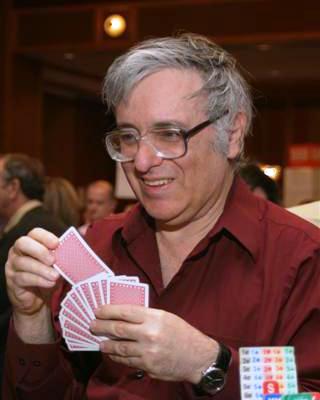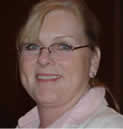Source: http://www.districtsix.org/ (Agosto/Septiembre 2004) Click the link to access to the whole article.
What is the strategy that experts use when they have a disaster?
I asked the panel the following question. You’re playing a seven-board Swiss match against a team that’s close to your skill level. On the first board of the match, you get to 7![]() vulnerable. Your combined values are 36 HCPs, but there’s a big problem. Your partnership had a keycard mind loss and you’re missing the
vulnerable. Your combined values are 36 HCPs, but there’s a big problem. Your partnership had a keycard mind loss and you’re missing the ![]() A. 17 IMPs for the bad guys. What strategy do you recommend for the next six boards? Would your strategy be any different if your team was significantly better than the opponents?
A. 17 IMPs for the bad guys. What strategy do you recommend for the next six boards? Would your strategy be any different if your team was significantly better than the opponents?
Point No. 1 and the most important point
Get the bad result out of your mind. You must put all your effort into playing the next six boards. You can’t think about who messed up. You can’t apologize. You can’t blame.
Point No. 2
It makes a difference what round it is. Losing an early match can be overcome with good play in subsequent matches. You will probably play poorer teams since you will have a bad record and good teams usually have good records, not bad records. If this is the final match, you won’t be able to overcome losing, however all victory points can be crucial in determining your final placing. Most experts say play normally. There will be other hands where you or your teammates will win IMPs. You don’t know what’s happening at the other table. I’ve even seen teams gain IMPs on the hand where you bid 7![]() off the
off the ![]() A. The opponents could be playing in a cue bid for instance.
A. The opponents could be playing in a cue bid for instance.

David Berkowitz: Most important, get the result out of your mind and think positively. You should however be on the lookout for some minor anti-percentage plays to go against the other table. The worst thing that can happen is the other team also got to 7![]() , and now you hand them the match. Nothing crazy from you, especially board two. Against weak opponents just expect to play good bridge and pick the IMPs up.
, and now you hand them the match. Nothing crazy from you, especially board two. Against weak opponents just expect to play good bridge and pick the IMPs up.
Curtis Cheek: Play «normally». Just getting the hands right will create about 10-20 IMPs over six boards, and who knows what weirdness is being perpetrated at the other table. I feel insulted when my teammates come back and say they lost 15 IMPs because they were shooting, trying to recover a big negative swing. What do I have over at the other table, mashed potatoes? At least give me a chance to help out.

Jeff Rubens: It sounds as if you are considering the scoring to be win-loss. If so, I would play normally unless an opportunity to take a moderate off-percentage opportunity arose. This strategy is more likely to be successful the more favored my team in the abstract, but even if the original chances were even, I think that, mostly, trying to win the normal way offers the best chance.

David Bird: Personally, I would not vary my tactics in the slightest after a big loss on the first board. Playing against the odds in any way is like throwing good money after bad. Every victory point is worth fighting for and the fact that you are starting from a bad base has to be accepted.
Grant Baze: The problem is incomplete. Are we playing win-loss or victory points? Is this the first match of the day, the last match, or somewhere in between? If it is the last match, what do we need to do to win the event, or are we just playing for pride? If we lose the match by a small margin and finish second or third, will that meet our objective (Someone on the team needs x points to reach some goal, or some such)? Do we need to win the match, do we need to blitz, or . . . . .? As John Travolta says in «Phenomenon,» «Specifics, Bob(?), specifics.» Anyway . . . 40 years ago, the bridge wisdom that was told to me by all the great West Coast players is that the worst strategy you can adopt in a knockout match (at the time there was no such thing as a Swiss Team) is to have a bad result and press hard trying to win it back. The theory is that if your teammates have a terrific set and you lose the match because of your efforts to recover from a bad result, your teammates will go bonkers. As far as I am concerned, that wisdom is still sacrosanct as far as knockout matches are concerned. However, while that wisdom applies to Swiss matches as well, it is not sacrosanct.
At victory points, if we have many matches left to play, I follow the wisdom of the sages and play normally. If we lose the match, we have not lost the event. As the number of matches we have left to play decreases, the more likely I am to ignore the accepted wisdom. If the disaster happens during the last match of the event, my partner and I as well as the opponents know we have to press. Press is different from shoot; if you press and miss, you still have a chance; if you shoot and miss, you lose. As we approach the last board of the match, and it is clear we are losing, we have to be willing to shoot.

Grant Baze: The problem is incomplete. Are we playing win-loss or victory points? Is this the first match of the day, the last match, or somewhere in between? If it is the last match, what do we need to do to win the event, or are we just playing for pride? If we lose the match by a small margin and finish second or third, will that meet our objective (Someone on the team needs x points to reach some goal, or some such)? Do we need to win the match, do we need to blitz, or . . . . .? As John Travolta says in «Phenomenon,» «Specifics, Bob(?), specifics.» Anyway . . . 40 years ago, the bridge wisdom that was told to me by all the great West Coast players is that the worst strategy you can adopt in a knockout match (at the time there was no such thing as a Swiss Team) is to have a bad result and press hard trying to win it back. The theory is that if your teammates have a terrific set and you lose the match because of your efforts to recover from a bad result, your teammates will go bonkers. As far as I am concerned, that wisdom is still sacrosanct as far as knockout matches are concerned. However, while that wisdom applies to Swiss matches as well, it is not sacrosanct.
At victory points, if we have many matches left to play, I follow the wisdom of the sages and play normally. If we lose the match, we have not lost the event. As the number of matches we have left to play decreases, the more likely I am to ignore the accepted wisdom. If the disaster happens during the last match of the event, my partner and I as well as the opponents know we have to press. Press is different from shoot; if you press and miss, you still have a chance; if you shoot and miss, you lose. As we approach the last board of the match, and it is clear we are losing, we have to be willing to shoot.
If our team is significantly better than the opponents, I would play normally. 17 IMPs is not hard to pick up if your team is significantly better.”
Point No. 3
Some experts look for small swings. They are willing to take a slightly anti-percentage play in order to create a swing.

Bobby Wolff: I suggest taking slightly different views on several (if possible) of the remaining hands. Those different views could be: Opening the bidding with my shortest minor instead of my longest (may get a luckier opening lead from the opponents for you or get a luckier bidding sequence that leads us to a makeable final contract not reached at the other table). Overbidding or possibly marked underbidding to accomplish your main objective of getting to a different contract at your table, which could luckily result in a favorable swing. A different opening lead against a prosaic sequence such as 1NT – Pass – 3NT. Holding ![]() Jxxxx
Jxxxx![]() xxx
xxx![]() KQx
KQx![]() xx I would suggest leading the
xx I would suggest leading the ![]() K instead of a spade. Doubling the opponents in a close contract—
K instead of a spade. Doubling the opponents in a close contract—
Holding ![]() QJ10x
QJ10x![]() 1098x
1098x![]() Qx
Qx![]() xxx and hearing the opponents bid 1
xxx and hearing the opponents bid 1![]() – 2
– 2![]() – 4
– 4![]() . Keep in mind that all of the above is probably anti-percentage but still possible enough to experiment. Of course if a couple of things work or other good boards appear, change back to your normal game (but NO discussion with your partner). Against poor opposition I would only take very close different views on boards two through four before I may look for a major swing if I hadn’t found one yet. Remember your opponents can be your best friend so don’t stray far.
. Keep in mind that all of the above is probably anti-percentage but still possible enough to experiment. Of course if a couple of things work or other good boards appear, change back to your normal game (but NO discussion with your partner). Against poor opposition I would only take very close different views on boards two through four before I may look for a major swing if I hadn’t found one yet. Remember your opponents can be your best friend so don’t stray far.

Marty Bergen: Look for opportunities, but don’t go crazy. Level of opponents is relevant.

Larry Cohen: Steve didn’t say, but I presume victory point scoring. If win-loss, I would start swinging for sure. If a 30-point scale, where winning by just one IMP is worth 18-12 victory points, I also might tend to swing a little more than with a 20-point scale where if we lose by say ten IMPs, it isn’t too disastrous (14-6). Also, is this match one of the day? If so, losing isn’t so bad –we’ll get an easier draw next round. If late in the day when in contention, swinging would be more relevant. In all cases, though, I think that down 17 (pretty sure) with only six deals to go, calls for some strange strategy.

Eddie Kantar: Bid and play aggressively; make close doubles. A seven-board match is a very short match to spot the opponents 17 IMPs.
Point No. 4
Only a few experts go the other way. They swing from the trees. As you can see, they could very easily make things worse.

Kit Woolsey: It would depend entirely on the scoring of the event. If it was victory points and this was the first match of the day, I would just play normal bridge. If it were win-loss, or circumstances were such that there was a big bonus for winning the match, then I would play normal «50 IMPs down» bridge — preempt aggressively, double aggressively, etc.
Author’s note: Normal bridge for Woolsey is 20 IMPs down bridge.

Kerry Sanborn: I would take every opportunity to create a large swing. At the other table, nobody knows about the disaster, so they won’t be looking for big swings but will be playing «close to the vest». I would play the same way against any team, but if able to garner a couple of smaller swings such as part score plus positions, I would return to solid play.
Conclusion:
Disasters happen and when they do the most important point is to keep playing bridge. If you are going to swing, and most of the panel says don’t, make them small type swings. Open 1 holding four diamonds and three clubs. Lead top of nothing instead of fourth best against 3NT. If you have K32 opposite AJ1054, the percentage play is to play the king and then finesse the ten. You can pick up the whole suit when they split 4-1. Anti-percentage would be to lead the Jack and finesse. Expect to pick up 18 IMPs on the next six boards since you are on the superior team. Any team with you on it must be superior.
